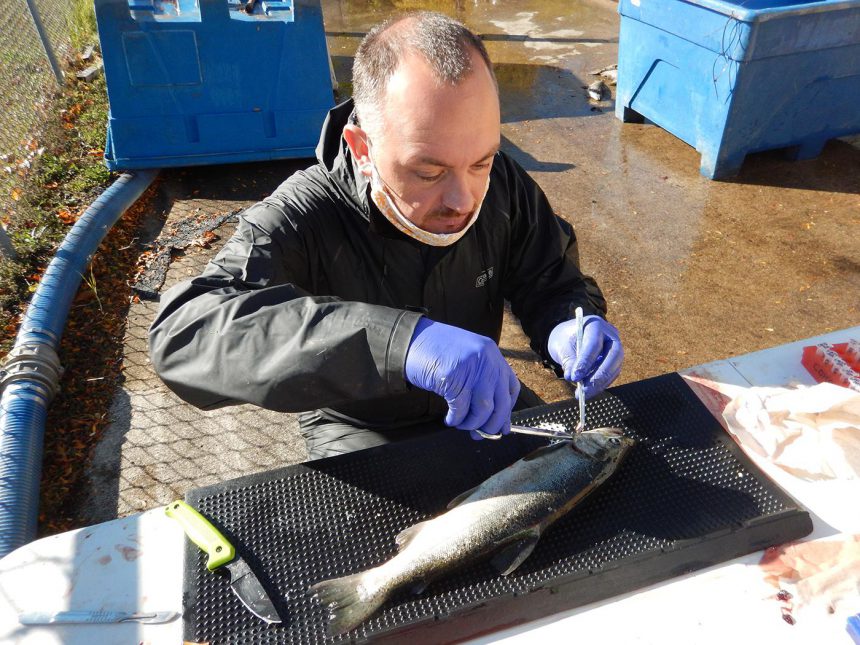Bartolomeo Gorgoglione, DVM, MSc, PhD, CertAqV, has been elected to serve as president of the World Aquatic Veterinary Medical Association (WAVMA), the society of reference for veterinarians dedicated to aquatic animal species, with more than 700 total members including more than 150 certified aquatic veterinarians (CertAqV), worldwide. He will serve as president-elect in 2022, president in 2023, and past president in 2024.
“I’m honored to assist WAVMA during my three-year presidential tenure, aiming to promote and improve the visibility of this still highly under-represented category of veterinarians and professionals,” says Gorgoglione.

Gorgoglione’s decision to take a leadership role in his field evolved over several years. Since 2011, he has served the European Association of Fish Pathologists (EAFP) as social media administrator and since 2013 as webmaster. Within WAVMA, he started the Education and Students Committee (ESC) in 2019, which manages three subcommittees and includes regular and student WAVMA members from multiple countries. Gorgoglione says that in just a few years, this work has yielded great rewards for WAVMA members and veterinary students.
Working with the WebCEPD subcommittee Gorgoglione restarted and consolidated a program to grant Continuing Education and Professional Development (CEPD) credits by hosting high profile international speakers to deliver lectures. That group consistently delivered monthly webinars in 2021, and covered a variety of aquatic animal species and topics including fish used in biomedicine research and aquaculture, marine mammals, zoonoses, and shellfish pathology.
Another subcommittee, the Student Chapter Support, established new WAVMA student chapters in several veterinary universities around the world, with the latest at Ankara University, Turkey in January 2022. They also recently established the student chapter mini grant, which allows official WAVMA student chapters to be awarded small grants of up to $500 to support novel aquatic activities at their universities. WAVMA’s Students and Resources Committee’s efforts continue to provide veterinary students with additional aquatic resources, including the promotion of available externship opportunities on the WAVMA website and through a new virtual student panel series, “A Sea of Student Opportunities.”
Gorgoglione’s efforts directly benefit students at the MSU College of Veterinary Medicine. “In 2021, we finally established the College’s WAVMA Student Chapter, part of the umbrella student club Zoo, Exotics, Wildlife, and Aquatics, for which I am an academic advisor,” explains Gorgoglione.
Dr. Bart (as he’s known by his students and colleagues) teaches to provide unique and updated knowledge about aquatic animals to University students.
“In 2021, I also restarted the Aquatic Animal Medicine Clerkship (PDI 636), developing a new syllabus to provide veterinary students with fundamental knowledge on core subjects through a combination of learning opportunities and methodologies. I alternate lectures, given with the generous contribution of many national and international guest lecturers, with different types of activities including excursions and both practical and group laboratory activities. My course allows students to learn about a variety of aquatic animals and environments, as well as stressors and pathogens affecting fish, to diagnose and prevent diseases in aquaculture. It also makes them aware of certifications, such as the WAVMA CertAqV Program, and of the many professional opportunities available to work with fish or other aquatic animals.”
During Gorgoglione’s three years on the WAVMA Executive Board, he hopes to maintain the ongoing activities and to increase membership by strengthening the network through timely communication of updates and the provision of educational resources, certification, and other professional opportunities.
“I will ensure a more efficient use of modern communication media, including the WAVMA website and social media, and initiate the highly needed modernization of the WAVMA journal, The Aquatic Veterinarian. I hope to continue my work in fostering collaborations between WAVMA and other relevant societies in the field, as I've done as an ESC chair, bridging with the EAFP and with the Thailand Aquatic Animal Veterinary Association. Taken together, these approaches will reinforce local and international connections, attracting new generations of aquatic veterinarians, biologists, and paraprofessionals in this expanding community,” says Gorgoglione.
Now more than ever, Gorgoglione adds, additional effort is needed to support and enhance aquatic veterinary medicine.
“Worldwide, there is an increasing demand for professional services and research related to a broad range of aquatic animal species. Aquatic veterinarians, scientists, and paraprofessionals play a key role in a global situation of fast-changing opportunities. This scenario is linked to the need of innovative therapeutic and prophylactic solutions to support the fast-growing sectors of aquaculture, stimulated by an increasing demand of sustainably farmed fish and shellfish,” Gorgoglione explains. “But there is also an increasing popularity of zoo attractions and ornamental pet fish, together with the exponential use of fish in biomedical research. Vets are also needed to support wildlife species management and to advise containment measures against the spread of emerging pathogens and of invasive aquatic species.”
Gorgoglione says he looks forward to his tenure in WAVMA’s leadership role and to the impact he can have with his new responsibilities.
“I’m very glad to have been elected to serve WAVMA as president, a key role that could provide great networking opportunities to accomplish my career goals and that will certainly help to confirm MSU as a key institution involved in this constantly growing field,” says Gorgoglione.
Gorgoglione is a principal investigator directing the Fish Pathobiology and Immunology (FPI) Program at Michigan State University’s Aquatic Animal Health Laboratory. He works in a joint appointment between the Departments of Pathobiology and Diagnostic Investigation at the College of Veterinary Medicine and of Fisheries and Wildlife at the College of Agriculture and Natural Resources. Gorgoglione’s research focuses on host-pathogen interactions specifically, he studies comparative pathobiological and immunological mechanisms during heterogenous infections in fish. His research applies to fish virology and parasitology, with emphasis on polymicrobial infections and on emerging fish health issues.
To learn more about Gorgoglione’s research, see Research Gate.
